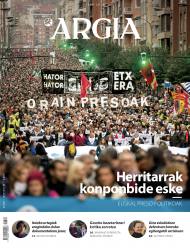Good intentions for the new year
We tend to start the year with a good desire. It has been three years since the implementation of the Sustainable Development Goals (SDGs) promoted by the United Nations (UN) and we can begin with an empathetic look at the environment. In September 2015, nearly 200 countries approved an agreement to boost the development of several societies. These SDGs were pursued between the years 2000-2015 and they wanted to broaden the perspective of the Millennium Development Goals, with uncertain results. In total, seventeen objectives were defined in 2015 and 169 targets were set under these main objectives. This long list, in addition to covering the eleven dimensions of the concept of poverty, addressed other areas related to the conservation of the environment and the reduction of inequalities.
Many think that there are too many objectives that cannot be achieved and that for others it is a list that reflects the complexity of the different societies and the problems of nature that cannot be overlooked. In any case, there are a number of common points among the reflections of the followers and opponents: on the one hand, it is a question of breaking the traditional North-South classification, that is, for the first time, they have stressed that development is the responsibility of all countries and not only of those to which it has been called “underdeveloped territories”; on the other hand, a hierarchy has not been established between the objectives, in some way it is possible to preserve the importance that has been desired. These features have not gone unnoticed, and although it is only a written text, many of those working in these areas have considered them to be novel views.
The UN SDGs are not binding, so it depends on each agent who wants to implement them. Many of us find it surprising that the
implementation of these important issues affecting the whole of society is optional.
However, without denying any new points, there is a criticism that has come to the fore strongly among the sceptics. One of them is the lack of realisation of the objectives. In other words, the objectives have not on several occasions defined the ways to achieve them. What, for example, are the transformative measures that will be activated for economic recovery without damaging the environment? What is more, when we talk about the need for global alliances, for whom and what do we want them for? One of the risks of defining excessively broad ideas is that the most powerful agents at the international and local level adapt in their own way, without meeting the needs of the majority.
Also noteworthy is the holding of a summit in the Ethiopian capital, Addis Abbeba, to establish the avenues and possibilities for financing the SDGs. In the report, various civil society organisations showed the importance of regulating the tax system to large international companies, claiming that the problem of poverty and inequality was systemic. It is known that these demands have been hampered by several countries in Europe and the United States, indicating the difficulty of transformation.
Furthermore, the SDGs are not binding, and so it is up to each actor to implement them and, where appropriate, to interpret and evaluate them. Many of us found it really surprising that the implementation of these important issues affecting the whole of society is optional.
In addition to the limits outlined in the previous lines, many other obstacles have been highlighted in recent years, which are likely to involve addressing highly complex issues. But along with these imperfections, a number of things have been invented, and it cannot be denied that they have received a great deal of support. This is reflected in the initiatives that have been launched in different parts of the world. In our case, there are many people who are making the way for these objectives to be adhered to our reality; in short, it will be better for us to leave their interpretation to large international companies, for the benefit of the majority.
Bidali zure iritzi artikuluak iritzia@argia.eus helbide elektronikora
ARGIAk ez du zertan bat etorri artikuluen edukiarekin. Idatzien gehienezko luzera 4.500 karakterekoa da (espazioak barne). Idazkera aldetik gutxieneko zuzentasun bat beharrezkoa da: batetik, ARGIAk ezin du hartu zuzenketa sakona egiteko lanik; bestetik, egitekotan edukia nahi gabe aldatzeko arriskua dago. ARGIAk azaleko zuzenketak edo moldaketak egingo dizkie artikuluei, behar izanez gero.
Ez da gauza berria politikari profesionalak gizarteko arazoak estaltzeko ahaleginetan ibiltzea. Azkenaldian Denis Itxaso -EAEko Etxebizitza sailburua- entzun dugu etxegabetzeei garrantzia kenduz eta aditzera emanez gurean bazterreko fenomenoa direla; eta Begoña Alfaro... [+]
Antropozentrismoaren aldaera traketsena eurozentrismoa izan zen. Europako mendebaldea, geografikoki, Kontinente Euroasiarraren penintsula txiki bat besterik ez da, baina lau mende luzez gertaera demografiko, teknologiko eta ideologiko batzuk zirela medio, bazter horretako... [+]
Badakizuenok badakizue, beste gauza asko bezala, euskararen aldeko borrokan ere politikoek, eragile batzuek eta hedabideek beraien antzezlana saldu nahi digutela, benetakoa balitz bezala.
Lehen urtean pozik jaso nuen, "Euskaraldi" hau. Zer edo zer zen, ezer ez zegoela... [+]
Euskarak, mendez mende, zapalkuntza sistematikoa jasan du, eta oraindik ere borrokan dabil egunerokoan bere leku duina aldarrikatzeko. Hizkuntza baten desagerpena ez da inoiz berez gertatzen; planifikazio politiko eta sozialak eragiten du zuzenean. Euskaldunoi ukatu egin izan... [+]
Oldarraldia ari du EAEko administrazioa euskalduntzeko erabakien aurka, berriz ere, enegarren aldiz. Oraingoan berrikuntza eta guzti, espainiar epaitegiak eta alderdi eta sindikatu antieuskaldunak elkarlanean ari baitira. Ez dira izan akats tekniko-juridikoak zuzentzeko asmoz... [+]
Igande gaua. Umearen gelako atea itxi du, ez guztiz. Ordenagailu aurrean esertzeko momentua atzeratu nahi du. Ordu asko aurretik. Zazpietan jaiki da, eta, bihar ere, astelehena, hala jaikiko da. Pentsatu gabe ekiten badio, lortu dezake gauak pisu existentzialik ez izatea. Akats... [+]
Naomiren etxeko eskailerak igotzen ari dela datorkion usainak egiten dio memorian tiro. "Ez da sen ona, memoriaren eta emozioaren arteko lotura da. Baldintzapen klasikoa", pentsatzen du Peterrek bere golkorako Intermezzo-n, Sally Rooney irlandarraren azken eleberrian... [+]
Joan den urte hondarrean atera da L'affaire Ange Soleil, le dépeceur d'Aubervilliers (Ange Soleil afera, Aubervilliers-ko puskatzailea) eleberria, Christelle Lozère-k idatzia. Lozère da artearen historiako irakasle bakarra Antilletako... [+]
Aspaldi pertsona oso zatar bat ezagutu nuen, urrun izatea komeni den pertsona horietako bat. Bere genero bereko pertsonengana zuzentzeko, gizonezkoengana, “bro” hitza erabili ohi zuen. Edozein zapaltzeko prest zegoen, bere helburuak lortzeko. Garai hartatik hitz... [+]
2020. urteko udaberrian lorategigintzak eta ortugintzak hartutako balioa gogoan, aisialdi aktibitate eta ingurune naturalarekin lotura gisa. Terraza eta etxeko loreontzietan hasitako ekintzak hiriko ortuen nekazaritzan jarraitu du, behin itxialdia bareturik. Historian zehar... [+]
Hurrengo ariketa egin ezazu zure lantokian, euskaltegian edo gimnasioan:
Altxa eskua Minneapoliseko George Floyd nor den dakizuenok.
Altxa eskua Madrilgo Mame Mbaye nor den dakizuenok.
Altxa eskua Barakaldoko X nor den dakizuenok.
Mame Mbaye manteroa duela zazpi urte... [+]
2022ko ekainaren 7an, Directa-k serie luze bateko lehen polizia infiltratuaren kasua argitaratu zuen. Martxoaren 5ean, Belen Hammad fikziozko izena erreta geratu zen, polizia-argotean dioten bezala. Jada hamar dira Directa, El Salto eta El Diario-k azken hiru urteetan argitara... [+]
Horra Libération egunkariak berriki argitaratu duen idazkia:
“Bayonne” bukatu da, Libérationek “Baiona” idatziko du
Hiri baten izenaren erabilpena ohiturazkoa delarik, egunkari batean izen horren erabilpena aldatzea zaila da. Alta, irakurleen... [+]
Eusko Jaurlaritzak eta Arabako Foru Aldundiak Datu Zentroen instalazioei ateak irekitzen dizkiete horiek arautzeko legedia sortu aurretik. Bilbao-Arasur Dantu Zentroarekin, bere lehen fasea gauzatuta, eta instalatzea amesten duen Solariaren Datu Zentroarekin, 110.000 m2... [+]



















